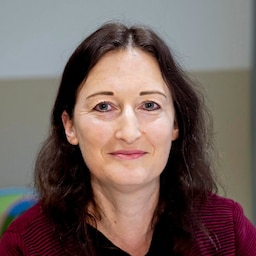Children's palliative care center
Trisomy 18: A life as a small miracle
Johanna Barborik has trisomy 18 and needs 24-hour care, which her single mother provides. At the MOMO Children's Palliative Care Center, they can both breathe easy.
When Johanna Barborik was born, doctors gave her a five percent chance of living to see her first birthday. The girl, who has been diagnosed with trisomy 18, is now seven years old. In what is known as Edwards' syndrome, the 18th chromosome is present three times, which has a serious impact on physical and cognitive abilities.
Mother Natascha Barborik only knew for sure after the birth. "During the pregnancy, it was clear that something was wrong. But I didn't want a placenta puncture, partly out of fear that the doctors might not treat her in the same way as the other babies," explains the 47-year-old. Johanna ended up spending two months in the neonatal unit.
Milestones that are much bigger
Before her, no trisomy 18 baby had ever left the ward alive. Johanna showed them that it is possible. The girl now breathes on her own, eats without a feeding tube and moves independently. Milestones that border on a minor miracle for Johanna.
Living simply, as normally as possible
"It was important to me that I live at home with her. As normal as possible," says Barborik. She didn't want support at first, especially from a palliative care facility for children. She is now glad that she has it. "Many parents are put off by the word. The word 'palliative' is associated with worries and reservations," says clinical psychologist Antonia Mittelbach, who has been supporting Barborik for seven years after the mother once attended a parents' café at the facility.
Time out from everyday life
In addition to mobile care, the MOMO Children's Palliative Care Center has been running the ZeitRaum in Währing for a year now, where sick children are cared for by nurses and therapists while their parents can take a deep breath. Barborik is here twice a month for four hours each time. "Johanna and I are together 24/7, this distance is very good for both of us," she says.
The parents have to deal with daily challenges and bureaucracy. They wonder what the future holds. Sometimes less is more and it helps them a lot just to listen.

Antonia Mittelbach, Klinische Psychologin bei MOMO
Bild: Imre Antal
Donations are needed
In addition to parents, Mittelbach supports siblings, as they often miss out. MOMO looks after a total of 150 families, but there is a need for more. But donations are needed for this.
This article has been automatically translated,
read the original article here.












Willkommen in unserer Community! Eingehende Beiträge werden geprüft und anschließend veröffentlicht. Bitte achten Sie auf Einhaltung unserer Netiquette und AGB. Für ausführliche Diskussionen steht Ihnen ebenso das krone.at-Forum zur Verfügung. Hier können Sie das Community-Team via unserer Melde- und Abhilfestelle kontaktieren.
User-Beiträge geben nicht notwendigerweise die Meinung des Betreibers/der Redaktion bzw. von Krone Multimedia (KMM) wieder. In diesem Sinne distanziert sich die Redaktion/der Betreiber von den Inhalten in diesem Diskussionsforum. KMM behält sich insbesondere vor, gegen geltendes Recht verstoßende, den guten Sitten oder der Netiquette widersprechende bzw. dem Ansehen von KMM zuwiderlaufende Beiträge zu löschen, diesbezüglichen Schadenersatz gegenüber dem betreffenden User geltend zu machen, die Nutzer-Daten zu Zwecken der Rechtsverfolgung zu verwenden und strafrechtlich relevante Beiträge zur Anzeige zu bringen (siehe auch AGB). Hier können Sie das Community-Team via unserer Melde- und Abhilfestelle kontaktieren.